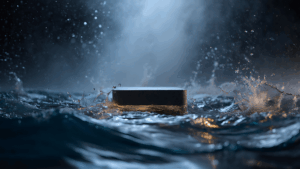The United Nations has a number of Sustainable Development Goals; No. 6 of which is to ensure access to water and sanitation for all.
This goal, along with many others, will be discussed at the COP26 conference in Glasgow this week. The overarching goal of COP26 is to reach a global net zero by 2050 and keep the optimal target of 1.5 degrees Celsius of global warming.
The supply of potable water is not universal, and the UN estimates that one in three people worldwide do not have access to safe drinking water. However, artificial intelligence (AI) offers cost-effective opportunities to help improve water quality around the globe, as well as other elements of the environment.
What is AI?
AI is technology that mimics human intelligence, learning and adapting to data in the same way that, as humans, we learn from what’s going on around us. AI is already in frequent use and affects many aspects of our lives, such as the recommendations of new programmes to watch on streaming services, suggestions for accounts to follow on social media, and the ‘you may also like’ suggestions on shopping websites. AI is also being developed for use in transport, agriculture, and health services.
The World Economic Forum published a report on ‘Harnessing Artificial Intelligence for the Earth’. In it, the authors conclude that: “The opportunity for AI to be harnessed to benefit humankind and its environment is substantial. The intelligence and productivity gains that AI will deliver can unlock new solutions to society’s most pressing environmental challenges: climate change, biodiversity, ocean health, water management, air pollution, and resilience, among others.”
Cleaning up the Great Pacific Garbage Patch
AI is at the forefront of the technology that’s been developed to help the Ocean Cleanup project clear the oceans of plastic rubbish. Computer modelling helps vessels find and target areas of rubbish more efficiently, with collection and storage of recovered plastic automated, and alerts sent to agencies when it’s time to collect and empty the bins. AI enables the operation to take place 24/7, considerably speeding up the process.
Water treatment
AI can also monitor the water quality in rivers, reservoirs, and lakes in real time, enabling water companies to manage water resources and spot pollutants and contamination quickly. It can also monitor the delivery of drinking water, instantly alerting water company staff to problems and allowing action to be taken before the water reaches our taps.
So-called ‘digital water’ uses software-based tools such as predictive analytics to track water quality, flow and pressure to help with water management, and AI could be especially useful in times of water scarcity.
Identifying leaks
AI is a useful tool in the detection of water leaks. Water efficiency is hugely important, not just to save your business money, but also to ensure the availability of this precious resource. With smart meters in place, AI makes it possible for companies to be alerted at the first sign of unusual water usage, as well as enabling them to use the data to assess the effectiveness of any water efficiency measures being implemented.
As the UK’s leading independent business water supplier, we offer smart ways of monitoring your water usage in order to identify water leaks, saving water at the same time as reducing your costs. Contact us to find out more, or read more about our business water services.



